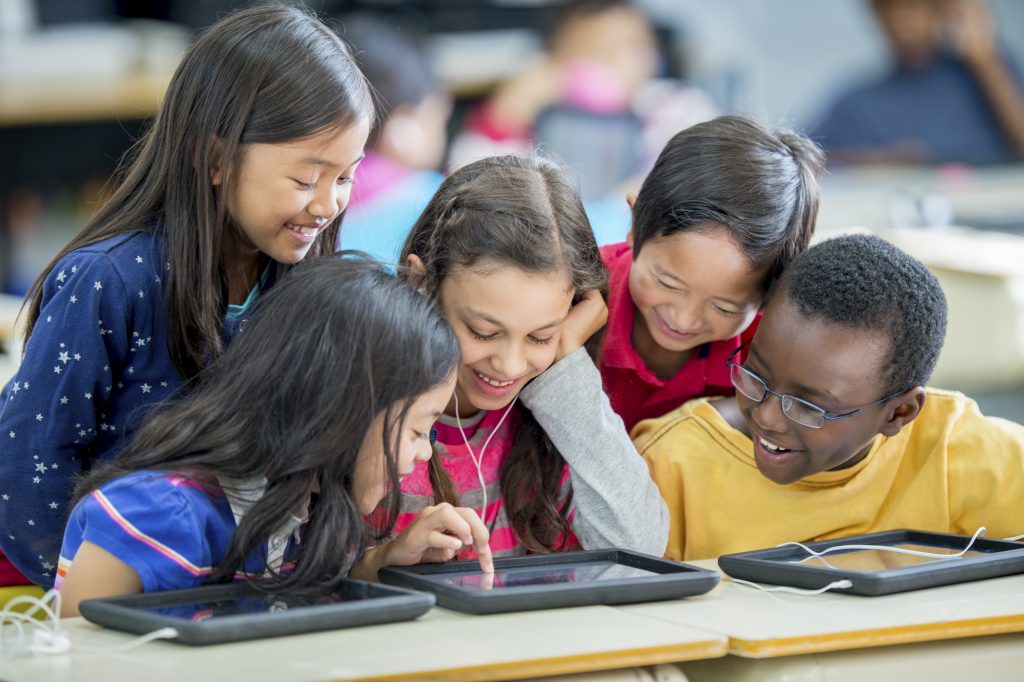New Reports Look at The Future of International Digital Learning, K-12

A new generation of online exchange programs such as Global Scholars is connecting students across borders and cultures and offering global experiences to students who would not have this opportunity without advances in modern technology. Two reports published today explore the value of these international digital exchanges in developing students’ global knowledge, tolerance of diversity, cultural understanding and respect for different perspectives. Broadly-inclusive global learning is of particular relevance as xenophobic trends grow, world problems become increasingly interconnected and complex, and cities are challenged by the needs of diverse populations.
The Future of International Digital Learning, K-12 by Marjorie B. Tiven, draws on expert testimony at the May 2016 Global Cities Symposium, the first gathering of its kind to explore the practice and promise of international digital exchange. The companion piece, Top Ten Questions to Ask About Global Digital Exchange, offers education leaders a decision-making tool. The Symposium convened civic leaders, academics and officials from 20 large U.S. school districts, as well as Barcelona, London and Warsaw. Both the Symposium and the reports reflect the frontline experience of Global Cities, Inc., a program of Bloomberg Philanthropies, which operates the digital exchange Global Scholars. The program connects more than 10,500 students ages 10-13 on five continents through secure e-classrooms and a shared curriculum that promotes global learning as well as digital proficiency, critical thinking, and communication skills.
“When we give students positive experiences with students from other countries, we not only enhance their educational journeys, we lay the foundation for a more peaceful world,” said Michael R. Bloomberg, 108th Mayor of the City of New York, speaking at the May Symposium.
Harvard Professor of Education Fernando Reimers, a keynoter at the Symposium, said: “A global education must be part of every child’s education. The Global Cities Symposium reports will be invaluable to all those who are working to educate citizens of tomorrow.”
“It is a question of equity,” said LaVerne Srinivasan, Vice President of the National Program and Director of the Education Program at Carnegie Corporation of New York. “Technology has made it possible for everyone to experience different cultures and perspectives, not just those students who can afford to travel or study abroad. These clear and timely reports can help educators find the program that fits their needs best, to the great benefit of both students and teachers.”
The Future of International Digital Learning, K-12 presents a framework that can help educators make the most of international digital exchange programs. Key questions addressed include: What characterizes an effective exchange? What is known about how these programs impact student learning and broad curricula goals? How can educators help students communicate in a global forum, consider new perspectives, and other skills of global competency? What practical advice comes from school districts that have piloted digital exchanges? The companion report, Top Ten Questions to Ask About Global Digital Exchange, equips educators to assess global education products and services.
The City of New York is among the 46 cities currently participating in Global Scholars e-classrooms, with students at 14 NYC Department of Education middle schools. NYC Department of Education Deputy Chancellor Phil Weinberg said, “Global Scholars provides our students with an innovative approach to teaching and learning, turning classroom experiences into global experiences as they tackle relevant problems with peers from across the globe. This prepares young people to contribute to the city and the world as critical thinkers, problem solvers, and collaborators.”
In Barcelona, where 32 schools participate in Global Scholars, the Catalan Regional Ministry of Education has set the program as one of the region’s priorities. “Global Scholars helps students use English in a formal and subtle way,” said Mònica Pereña, Deputy Director General of Language and Multilingualism. “In the digital classroom, students have to find strategies to understand the same thing said in different ways—and they learn that what they are doing in their city may be done differently in other cities.”
In addition to Mayor Bloomberg, civic leaders attending the Symposium included Michael A. Nutter, 98th mayor of Philadelphia, who reflected on the critical importance of educating students to interact thoughtfully with the world beyond their classrooms. Also participating in the Symposium were directors of the international digital exchanges Kizuna Across Cultures, Out of Eden Learn, and Reach the World.
The full reports are posted both on the Bloomberg Philanthropies website: http://bit.ly/2ktt1Gg and on the Global Cities website: www.globalcities.org.
# # #
More About:
Global Cities, Inc., a program of Bloomberg Philanthropies, works to cultivate the next generation of global citizens and to improve how cities across the world connect and communicate. Its signature program Global Scholars connects 10,500 students ages 10-13 to one another through a shared original curriculum and a secure e-classroom. There is no charge to schools for participation in Global Scholars. There is no charge to schools for participation in Global Scholars. Please visit www.globalcities.org.
Marjorie B. Tiven is the Founder and President of Global Cities, Inc. From 2002 through 2013, she served as New York City Commissioner of the Mayor’s Office for International Affairs, under the administration of Michael R. Bloomberg.
Bloomberg Philanthropies’ mission is to ensure better, longer lives for the greatest number of people. The organization focuses on five key areas for creating lasting change: Public Health, Environment, Education, Government Innovation and the Arts. Please visit www.bloomberg.org.
Contacts:
Global Cities: Meg Louis, Vice President, Global Cities, Inc.,212-618-6345, mlouis@globalcities.org
Bloomberg Philanthropies: Rebecca Carriero, 212-205-0182, rebeccac@bloomberg.org